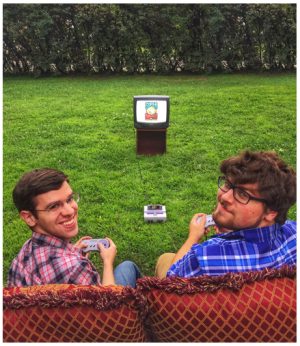If you need entry points for a new podcast, the eight-year-old Super Marcato Bros. Video Game Music Podcast has quite a few.
If you're a video game fan, then its 400+ episodes probably include a few of your favorite series. If you're not a video game fan but appreciate good music, the eclectic catalog of episodes posted over its eight-year history is likely to include your favorite genre—and a deep dive into musical theory through refreshing eyes. Beyond the shows longevity, Super Marcato Bros. is noteworthy because of the journey its hosts have taken from simply appreciating video game music to becoming game-music composers themselves.
How many three-brother podcasts are there, anyway?!
Brothers Karl and Will Brueggemann started their podcast as college students practicing music theory by applying their knowledge to the video game music theyd grown up loving, particularly their favorite NES and SNES soundtracks. Their early episodes highlighted favorite game series, like Castlevania; explored the similarities between music in the same context, such as boss battles, across games; and brought their music theory experience to bear on the jazz harmonies of Super Mario Bros. They also introduced the Show and Tell series, now a regular fixture on the podcast, in which Karl and Will introduce each other to unfamiliar music.
One of Super Marcato Bros.' great early episodes is "Breakdown and Analysis Vol. 1." Karl and Will dig deeper into the music theory behind some of their favorite video game music from the '80s and '90s with the help of third Brueggemann brother Marty, who has since become a regular guest on the show, and who sits down at the piano for this episode to walk listeners through the structure of the songs he and his brothers discuss. Their analysis contextualizes video game music in the broader history of 20th-century composition. Super Mario Bros.' overworld theme is built on classic jazz harmonies and rhythms expertly compressed into the Nintendo Entertainment System's simplistic sound production system, while pieces from The Legend of Zelda and The Secret of Monkey Island draw on elements of film scores to set the scene. This was the first time I'd thought of video game music as more than just accompaniment for a game, and it got me excited about what else the Marcato Brothers might have planned.
"Final Fantasy 4-6" is another of their most memorable episodes. The sequel to an episode about the first three Final Fantasy games, this episode includes a discussion of how Final Fantasy music developed in the move from the NES to the SNES and how the games' themes draw on musical tropes from both Japanese and American films to convey the emotions associated with their plots. These three games tell distinct stories in distinct settings, and the Brueggemanns discuss how the series's composers balance the need to present each game as unique with the need for continuity between them through variations on shared themes.
From homages to jobs, from interviews to spin-offs

The podcast grew as the Brueggemanns musical careers developed, starting with Original Showcase episodes dedicated to their own chiptune homages to their favorite games, including the Metroid-like album Child of the Chozo and a Sonic-esque series of albums appropriately named Sonicesque. They also began sharing pieces composed by the chiptune music community Overclocked Remix, discussing the cultural context of both the music they showcase and the technology used to make it. Later on, they opened their set lists to fan submissions, allowing their listeners to introduce them to new music through the Read More – Source
[contf] [contfnew] 
arstechnica
[contfnewc] [contfnewc]







